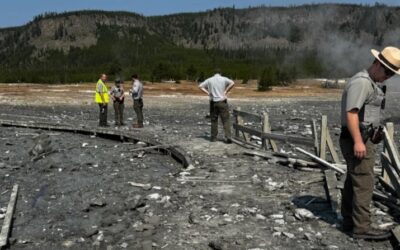The opening of the Wyoming legislative session delivered a key development for Teton County. On Monday, a bill that would have drastically undermined Jackson’s affordable housing program died in the House on introduction 30-29.
The speedy death of House Bill 22 was somewhat surprising. It seemed poised for a battle. In November, the bill passed out of a committee 8-6 despite testimonies and letters from opponents, including town councilors, county commissioners, the sheriff, fire chief and others. And it is the third such bill in as many years taking aim at Jackson’s affordable housing program. The legislation would have prohibited towns and counties from requiring developers to pay for or build housing for their employees.
The bill’s death was the result of behind the scenes efforts.
For one thing, Natalia D. Macker, chair of the Board of Teton County Commissioners, said commissioners from across the state spent hours lobbying their local representatives about the bill’s harmful effects on local government.
But, Macker said it was Teton County Rep. Andy Schwartz who made the big push. Before the vote, the Democratic state lawmaker met with dozens of his fellow representatives.
“To be blunt, I just talked to almost every member of the House and lobbied them hard, and by hook or by crook, I got 30 votes,” Schwartz said.
He convinced his colleagues with a few talking points. “The obvious one is local control,” he said.
But local versus state control isn’t a new issue in Cheyenne. In recent years, other bills have emerged aimed at eroding the authority of local government, specifically Jackson and Teton County’s. Schwartz says his colleagues know he’s strongly opposed to weakening the local government here. So instead, he focused more on what lawmakers from other parts of the state might not know: “The nature of the housing problem in Teton County and also the nature of how we have used exactions in the past to build workforce housing. Because it doesn’t happen anywhere else [in the state], it’s not a concept they know.”
Those exactions, or housing mitigation, require developers to pay for some portion of their employees’ housing. It has been used here for 25 years to help alleviate an endless housing crisis.
In recent years, mitigation rates have placed Jackson’s affordable housing program under the microscope. In 2018, local officials passed new rates. They require developers to build or pay for a larger portion of employee housing.
But there have been some vocal critics, namely members of the advocacy group Jackson Hole Working. Last September, they told a legislative committee visiting Jackson that those rates have created a “no-growth” situation.
In a statement issued to KHOL in November, JH Working’s Ted Staryk said current regulations are “a significant barrier to small business, redevelopment and entrepreneurship. The regulations are also “failing to produce what they are intended to: substantial workforce housing.”
According to the Town of Jackson, businesses in Teton County grew under current mitigation rates by 2.2%. Town of Jackson community engagement specialist Susan Scarlatta says it’s important to remember that it takes at least a couple years for policies to work and that local government is still issuing business licenses. “Business is still happening, growth is still happening here.”
Schwartz, meanwhile, says he shares Jackson Hole Working’s concerns and is working with local officials “to at least make sure they reconsider.”
Still, he said, “it’s not my position to determine what those rates should be. But I think they at least have a responsibility, knowing it has created some problems, to take a look and see if the rates are still appropriate.”
For his part, Mayor Pete Muldoon says he is amenable to changing such regulations.
“Our mitigation policies and regulations are not perfect. They never will be perfectly fair, but we do strive to make them as fair as possible.”
That sentiment has furthered the conversation in the business community. In response to the death of HB22, Staryk said in a statement: “While Jackson Hole Working has been monitoring legislation pending in Cheyenne, we are committed to working locally and have seen progress since the fall from local electeds who know this current system is not working and not producing housing.”
Elected officials recently voted to launch a new housing nexus study which could shift housing policy. The last one helped inform the current mitigation rates. But it’s seven years old “and things have changed,” Muldoon said.
The study sets the ceiling. “It doesn’t tell us what the rates will be, it tells us where the jobs are coming from, who is generating the jobs, the impact,” Muldoon said.
Then it leaves it up to the policymakers to decide how much, if any, of that impact they want developers to mitigate.
Recently Muldoon proposed an amendment that could lower mitigation rates. He says it would cost folks no more than a pretty penny. The amendment would address brick- and-mortar businesses that collect sales tax and are also paying mitigation (housing is funded partially through sales tax receipts). “The idea is that if we were to move to a seventh cent of general sales tax, there would be a substantial reduction in housing mitigation for businesses creating new development.”
Such an amendment would require three levels of support. The Town Council and the Board of Teton County Commissioners would need to give it the green light. Then voters would have to approve it in the November election.
Macker said it’s not impossible but, “there’s just a lot of ‘ifs’ in that chain of events.”
In the meantime, Macker is undeterred. “What I’ve heard from everyone and what I’ve said here in Cheyenne is that we may not have it right. All of us are human—the Legislature doesn’t always get it right every time either—but we are committed to continuing to work on it.”
Because according to these officials, the goal, as Teton County Rep. Mike Yin put it, is to make sure legislation like House Bill 22 “doesn’t keep coming back.”





